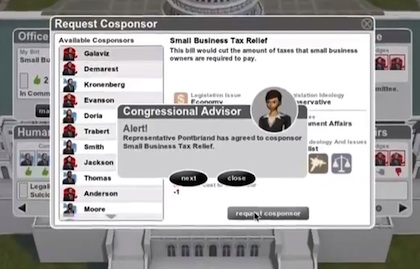Gaming | News
Georgia Perimeter Professor Takes on Multi-Player Government Game
- By Dian Schaffhauser
- 03/05/13
McGraw-Hill Education has entered the higher ed gaming market by launching an immersive multiplayer game covering the subject of American government and intended for integration into course curriculum. Government in Action is the first in a line of games that will make up the McGraw-Hill Practice line. According to one instructor who has tested the game with his students, its use has made study of the subject "more enjoyable" for students.
Government in Action puts students into the role of members of Congress and allows them to compete against fellow students in working with lobbyists and national media, seeking co-sponsorship of bills from members of a competing party, passing legislation to raise their political capital, and running for re-election. Players have limited resources to spend, which means they need to cooperate with other students to succeed.
| | 
McGraw-Hill's Government in Action is designed to help students understand American government by putting them in the role of Congress members. | |
"Government in Action has helped me bring my American Government course to life by creating an engaging environment for students to explore the reality I'm teaching," said Professor Jason Seitz of Georgia Perimeter College. "Government in Action helps my students tie all of the concepts in my course together to develop a deeper understanding and knowledge of the subject. With an engaged classroom, I can spend less time transferring facts and more time exploring implications. Not only has Government in Action made studying American Government more enjoyable for my students, it has made teaching it more fun, too."
Georgia Perimeter, which has five campuses and 27,000 degree enrollments, began using an alpha version of the game in spring 2012; it moved to a beta version in fall 2012 and version 1.0 this spring. The government classes use the game for the entire semester. Said Seitz, he focuses game activities on what chapter is being covered in class that week. Students play sessions in and out of class. Gameplay averages about an hour or two each week. During spring 2012 and fall 2012, Seitz flipped his classroom; students spent most of their class time in the game. This semester he's using the game more outside of class.
The program costs $40 per student and is available only for students at participating institutions. A demo of the game is available at mhpractice.com.
Other games in the Practice line include Practice Marketing, which launched in 2012 and is in use in several institutions, including Australia's Queensland Institute of Technology, and Practice Operations, which is currently in beta and will launch in fall 2013. Practice Marketing puts students into a competitive, real-world environment to learn about marketing principles and Practice Operations allows participants to manage operations of a clothing manufacturing and distribution company to strengthen skills in critical thinking and strategic decision making.
"With McGraw-Hill Practice and Government in Action, we're incorporating the leading principles of cognitive science and technology in our product development," said Stephen Laster, chief digital officer of McGraw-Hill Education. "By tapping into the way today's students learn most successfully--including real-life simulations and the competitive elements of gaming--we are helping to improve student performance."
About the Author
Dian Schaffhauser is a former senior contributing editor for 1105 Media's education publications THE Journal, Campus Technology and Spaces4Learning.

